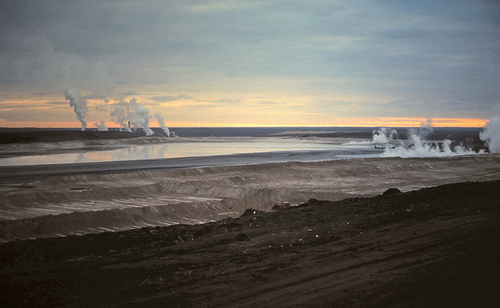Alberta’s tar sands a humanitarian issue, too
 Tar sands excavation north of Fort McMurray, Alberta, in 1981. Despite a recession, the project continues to expand. (Photo by CanadaGood via Flickr)
Tar sands excavation north of Fort McMurray, Alberta, in 1981. Despite a recession, the project continues to expand. (Photo by CanadaGood via Flickr)Update: Alberta continues fight against EU climate measures and Environment Minister Peter Kent outright lying to Parliament.
I was first introduced to the PR paradox of “ethical oil” when my friend Ben West at the Wilderness Committee went head-to-head with former tobacco industry lobbyist Ezra Levant in a debate on the subject. In this week’s Science Matters column, David Suzuki and Faisal Moola pull apart Levant and his fellow Conservatives’ argument, saying “the ‘ethical oil’ argument they promote has >holes as big as the ones in the ground around Fort McMurray.”
The environmental impacts alone should be a no-brainer. The razing of forests just to drill releases carbon dioxide — and if allowed to expand, an area of boreal forest the size of Greece will be industrialized with little hope of reclamation. The volume of greenhouse gases emitted prevent Canada from achieving any progressive, critical targets on GHG reductions and therefore thwart global efforts to reach consensus. The world’s largest construction project, the tar sands can be seen from space, but its effects are felt right here on earth, and no more deeply than by the First Nations downriver of the project, who are seeing higher than normal rates of rare cancers caused by toxic contaminants. Fish are turning up deformed, the water is polluted, the air is polluted. I see absolutely nothing ethical about this. It’s hypocritical for the Conservatives to suggest that oil from other nations be avoided because of human rights violations or lack of democracy. There is a human rights crisis going on in Prime Minister Steven Harper’s own back yard while his so-called “Environment Minister” Peter Kent claims our source of oil is ethical.
In a final jab against Kent’s disappointing performance so far, Suzuki and Moola write, “It might also help if Canada’s environment minister spent more time protecting the environment rather than appeasing the oil industry and its apologists.”
Regardless of how much you know about the tar sands, and especially if you know next to nothing (what better reason to learn?), I recommend the Nature of Things special, Tipping Point: the Age of the Oil Sands, repeating on CBC News Network, February 12 at 7pm ET. (Also available online.) Even if you’re informed like me you’ll still be shocked by its scale, new findings, and new political tactics to confuse the public. Either way, prepare to feel angry.
It’s time to move ahead with renewable, low-impact energy sources for the sake of our health and that of our planet.
 This daily green blog is in support of David Suzuki’s 75th birthday fundraising campaign put on by the David Suzuki Foundation. Please help me out by sponsoring me online now.
This daily green blog is in support of David Suzuki’s 75th birthday fundraising campaign put on by the David Suzuki Foundation. Please help me out by sponsoring me online now.
Note: I am writing solely on my own behalf, and do not claim to represent the David Suzuki Foundation or its views here.



